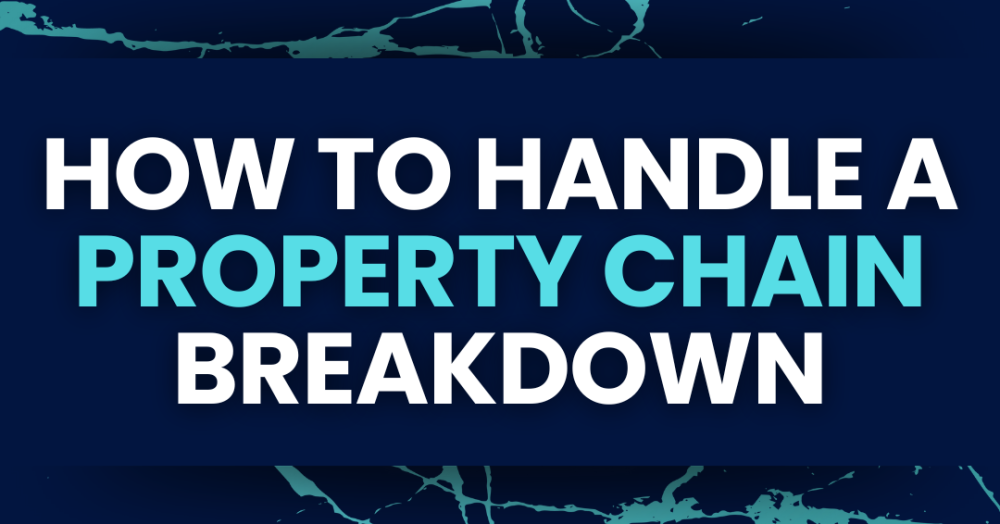Buying or selling a home in the UK can be an exciting time—but also a stressful one, particularly when you're part of a property chain. While it's often unavoidable, being in a chain introduces multiple dependencies.
If one sale or purchase in the chain collapses, it can throw off the entire sequence of transactions. This is known as a property chain breakdown—and it’s a common issue in the UK housing market.
So, what should you do if it happens to you?
Below, we explore what causes property chain breakdowns, how to respond effectively, and practical ways to prevent or recover from them.
What Is a Property Chain?
A property chain is a sequence of buyers and sellers connected because each purchase depends on the sale of another property. For example:
Buyer A is purchasing Buyer B’s home.
Buyer B is purchasing Buyer C’s home.
Buyer C is purchasing Buyer D’s home.
If any link fails—say Buyer B pulls out or experiences financing issues—the entire chain can be jeopardised.
Why Do Property Chains Break Down?
There are several reasons a chain might collapse:
- Buyers or sellers change their minds – People may get cold feet or encounter a life event that alters their situation.
- Mortgage offers fall through – Lending criteria can change, valuations can come in lower than expected, or buyers might not secure the loan.
- Poor survey results – If a survey reveals serious structural issues, buyers may pull out or renegotiate.
- Delays in conveyancing – Legal delays or document errors can stall the process and frustrate other parties.
- Gazumping or gazundering – Although frowned upon, sellers sometimes accept higher offers last minute (gazumping), or buyers lower their offer unexpectedly (gazundering).
- Completion date conflicts – If parties can't agree on moving dates, the deal may fall apart.
What to Do if the Property Chain Breaks
1. Identify the Weak Link
The first step is to find out exactly where and why the breakdown has occurred. Your estate agent and solicitor should be able to tell you which party caused the issue. Once you know what went wrong, you can assess your options.
2. Communicate Quickly and Clearly
Open and honest communication with all parties is key. A delay doesn’t always mean the chain is beyond saving. Perhaps a renegotiation, time extension, or different financing solution can keep things on track.
3. Explore Temporary Fixes
If one party has temporarily hit a roadblock, consider solutions such as:
- Bridging loans: A short-term financing solution that allows you to complete your purchase while waiting for your own sale to finalise.
- Rental agreements: You may be able to rent the property you’re buying until the chain is restored.
- Flexible completion dates: If everyone is willing, shifting timelines may resolve the issue.
4. Replace the Problem Link
If a buyer or seller pulls out completely, it may be time to look for a new link in the chain. This could mean:
- Re-marketing your property
- Seeking a chain-free buyer or cash buyer
- Finding another suitable property to purchase if your seller backs out
- Quick action from your estate agent can make all the difference here.
5. Rebuild the Chain if Possible
Often, people involved in the chain want to make the move work just as much as you do. If everyone is still motivated, a slightly altered or shorter chain might be possible. This may involve:
- Adjusting prices slightly to secure a faster buyer
- Offering to cover minor costs (e.g., survey fees) to keep the deal alive
- Being flexible about completion dates
How to Prevent a Chain Breakdown
While not every chain issue can be avoided, there are smart steps you can take to reduce the risks:
1. Work with Proactive Professionals
Choose experienced estate agents, mortgage brokers, and solicitors who are known for their communication and responsiveness. Chains collapse more often when communication is poor.
2. Vet Your Buyer
If you’re selling, make sure your buyer has a mortgage agreement in principle and is ready to move forward. Cash buyers or chain-free buyers are often more reliable.
3. Keep Paperwork in Order
Delays from missing documents or incorrect details can cause unnecessary hold-ups. Get your paperwork ready early, including ID checks, proof of funds, and any warranties or certificates.
4. Set Realistic Timelines
Avoid overly ambitious completion dates. Give all parties enough time to complete surveys, mortgage processing, and legal checks properly.
5. Have a Backup Plan
Whether it’s short-term rental accommodation or a contingency mortgage, it’s wise to prepare for the possibility of a breakdown. It gives you breathing room if the worst happens.
Final Thoughts
A property chain breakdown can be disheartening, but it's not the end of the road. In many cases, the situation can be rescued with the right action, communication, and flexibility. If that’s not possible, being prepared to pivot quickly will put you in the best position to move forward without losing too much time—or money.
Navigating a chain takes patience, but with the right team around you, it’s entirely manageable. If you want an award winning team of estate agents to help you through all possible scenarios then give us a call on: 0121 681 6327
